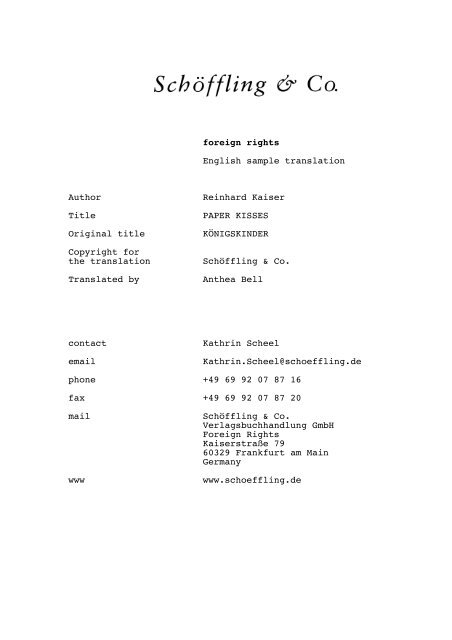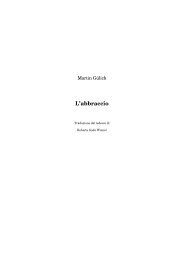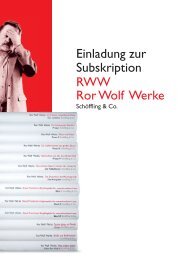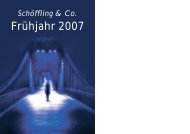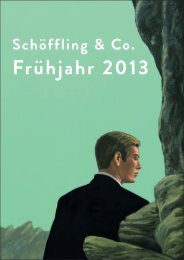foreign rights English sample translation Author Reinhard Kaiser ...
foreign rights English sample translation Author Reinhard Kaiser ...
foreign rights English sample translation Author Reinhard Kaiser ...
You also want an ePaper? Increase the reach of your titles
YUMPU automatically turns print PDFs into web optimized ePapers that Google loves.
<strong>foreign</strong> <strong>rights</strong><br />
<strong>English</strong> <strong>sample</strong> <strong>translation</strong><br />
<strong>Author</strong> <strong>Reinhard</strong> <strong>Kaiser</strong><br />
Title PAPER KISSES<br />
Original title KÖNIGSKINDER<br />
Copyright for<br />
the <strong>translation</strong> Schöffling & Co.<br />
Translated by Anthea Bell<br />
contact Kathrin Scheel<br />
email Kathrin.Scheel@schoeffling.de<br />
phone +49 69 92 07 87 16<br />
fax +49 69 92 07 87 20<br />
mail Schöffling & Co.<br />
Verlagsbuchhandlung GmbH<br />
Foreign Rights<br />
<strong>Kaiser</strong>straße 79<br />
60329 Frankfurt am Main<br />
Germany<br />
www www.schoeffling.de
© Schöffling & Co. Verlagsbuchhandlung GmbH, Frankfurt am Main, Germany<br />
<strong>Reinhard</strong> <strong>Kaiser</strong> – Königskinder / <strong>English</strong> <strong>sample</strong> <strong>translation</strong><br />
((opening section pp 7-20))<br />
I was not in search of stories when I found Rudolf Kaufmann's first letters to Ingeborg<br />
Magnusson — in May 1991, at a stamp auction in Frankfurt. There were over seven<br />
thousand lots on offer, and before the auction I asked to see ten or a dozen of them,<br />
lots I had marked in the catalogue. It described Lot 6673 as: "Germany, c 1890–1955,<br />
large quantity of stamps (unused, with and without postmarks), including bundled<br />
items, also cards, letters and dispatch notes from the German Reich, etc., varying<br />
condition, extremely high catalogue value! Reserve, DM 500.00."<br />
On viewing, the lot proved to be a carton containing albums, card mounts,<br />
semi-opaque cellophane bags and cigar boxes full of stamps. Among all the run-of-<br />
the-mill stuff and a few philatelic curiosities, I came upon a batch of some thirty<br />
envelopes, all sent by the same person between 1935 and 1939 from Königsberg and<br />
various other German cities, all addressed to the same woman at the same Stockholm<br />
address. The envelopes still had letters inside them.<br />
Viewing at an auction does not give you time for extensive reading. However,<br />
even a brief glance at two or three of the letters showed that they dealt, at some<br />
length, with a love affair of the period<br />
just before the Second World War. That was all I knew when I decided to bid for the<br />
carton and its entire contents: stamps, history, stories.<br />
During the auction there turned out to be considerable interest in Lot 6673.<br />
What stamp auctioneers describe in their post-sale reports as a battle of bids broke<br />
out. I would not have gone above twice the reserve just for the stamps, but my<br />
curiosity to know what was in those letters kept me bidding even beyond three times<br />
the reserve. The longer I went on holding up the card with my bidding number on it,<br />
however, the less could I see why anyone without my double motive — the stamps<br />
and the story — would force the price for the lot up so high. In the end I was bidding<br />
against a single determined opponent, someone I could not see. The auction room was<br />
L-shaped. I was sitting in the long part of the L and my opponent in the short part,<br />
while the auctioneer stood at his desk in the angle between them, indicating me and<br />
the other bidder in turn, reciting his counting-out rhyme as the figures moved in<br />
monotonous but unnerving leaps of fifty toward two thousand Deutschmarks.<br />
Stamps have their market price. Some may be rare, but very, very few are<br />
unique. Fantastic prices are hardly ever paid for stamps. Yet a man bidding anything<br />
<strong>Reinhard</strong> <strong>Kaiser</strong> – Königskinder<br />
2/11
© Schöffling & Co. Verlagsbuchhandlung GmbH, Frankfurt am Main, Germany<br />
<strong>Reinhard</strong> <strong>Kaiser</strong> – Königskinder / <strong>English</strong> <strong>sample</strong> <strong>translation</strong><br />
at all, high or low, for a story he doesn't know is paying a fantastic price anyway. That<br />
was what I did, that Saturday afternoon in May 1991.<br />
I took the carton I had acquired home — eager to find out what it contained,<br />
but not prepared for a story that would maintain its grip on me for years.<br />
***<br />
Mine lilla kaere Ingeborg, my dear little Ingeborg, you won't have forgotten me and<br />
your visit to Bologna in spite of the beauties of Venice. Those two lovely days still<br />
make me feel wonderful. The only trouble is they were too short. All I have left are the<br />
photographs of you smiling at me "like a girl in love." If you want any of the pictures,<br />
write and tell me and I'll make you enlargements. There's Sheet I and Sheet II, and the<br />
numbering goes like this:<br />
1 2 3<br />
4 5 6<br />
7 8 9<br />
10 11 12<br />
For instance, Sheet I, no. 8. I'm looking forward to your letter. I hope you're really<br />
enjoying Venice. Your red nose came out beautifully, of course! I'm going to S. Luca<br />
on Sunday, and I'll think of you. Write soon and tell me when you'll be passing<br />
through Greifswald. I'll let my friends know. I mean, say when you're leaving Berlin. I<br />
send you a very, very loving kiss. Your Rudolf.<br />
A card without a date, no bigger than a playing card, both sides covered with small<br />
handwriting in black ink, and sending a kiss — perhaps the first kiss he sent her by<br />
letter because he could not give it in person. The real kisses exchanged in Bologna,<br />
the kisses preceding this paper kiss, are gone now. The memory of such real kisses<br />
lingers on with the lovers who once gave them, and after that I suppose nothing of<br />
them remains. However, the paper kiss sent right across Europe by mail sixty years<br />
ago has been preserved. There it is for anyone to read, once a contact between the two<br />
of them, bridging the distance of space, now a contact between them and us, bridging<br />
our times.<br />
They met in Bologna early in the summer of 1935 — a young German from<br />
Königsberg and a Swedish girl from Stockholm. Ingeborg Magnusson was on<br />
vacation in Italy, visiting Florence, Rome and Bologna. Rudolf Kaufmann had been in<br />
Bologna for several months, but not because he wanted to see the country and its<br />
people, not of his own volition. Circumstances in Germany had driven him to Italy.<br />
<strong>Reinhard</strong> <strong>Kaiser</strong> – Königskinder<br />
3/11
© Schöffling & Co. Verlagsbuchhandlung GmbH, Frankfurt am Main, Germany<br />
<strong>Reinhard</strong> <strong>Kaiser</strong> – Königskinder / <strong>English</strong> <strong>sample</strong> <strong>translation</strong><br />
Luckily for him, as it turned out, for if he had not been in Bologna in the summer of<br />
1935 he would never have met Ingeborg Magnusson.<br />
The ground had begun to give way beneath his feet some time before. He had<br />
been in a vacuum for two years, and did not like it. Now he suddenly didn't mind the<br />
sense of being up in the air. Now he felt like floating, even flying — with her, beside<br />
her, for a day in Bologna, for a second day in Venice when he followed her there.<br />
Then their time ran out. Their ways parted. Inge went back to Stockholm, he returned<br />
to Bologna. They began corresponding. Her letters to him were not preserved; his<br />
letters to her have survived. The little undated card seems to have been the first.<br />
Early that summer of 1935, in Bologna, Rudolf Kaufmann was expecting visitors<br />
from Germany. His elder brother Hans and Hans's wife Vera were on vacation in Italy<br />
and said they would come to see him. With them, an unexpected but immediately<br />
welcome guest, was their "delightful travelling acquaintance", a young woman from<br />
Sweden.<br />
Just how Rudolf Kaufmann and Ingeborg Magnusson became intimate with<br />
each other in the brief time they had available is not quite clear from the hints in the<br />
letters, but photographs were involved.<br />
As soon as he had seen her for the first time he sent her a photograph of<br />
himself at the hotel where she was staying — a bold, even impertinent step, but she<br />
did not think it intrusive. Indeed, she was delighted, and had already kissed the picture<br />
many times before exchanging a first kiss with its subject.<br />
He, on the other hand, seems to have been smitten while looking at her<br />
through the "multiple picture camera" he used in the Multifoto studio where he<br />
worked in Bologna. Perhaps he fell in love with her as he captured her picture on<br />
photographic plates — there SHE was, thirty times over; her picture, thirty times.<br />
Twelve small stamp-sized photographs would fit on a single plate in rows of three and<br />
columns of four. Thirty pictures on two and a half plates. Perhaps he didn't ask her to<br />
"say cheese" from where he stood behind the camera. Perhaps he plucked up his<br />
courage and suggested, instead, "Why don't you just smile at me like a girl in love?"<br />
Or perhaps it was all quite different.<br />
However, they certainly went to San Luca together, a place with fine views in<br />
the mountains outside Bologna (you reached it by cable car). The letters are quite<br />
clear about that. They often return to the subject of San Luca: the air there, the grass,<br />
the wine and the tagliatelle, the tough roast meat, the mountain, the flowers, the rocks<br />
and glowworms. In his letters, Rudolf Kaufmann calls the cable car a floating car.<br />
Possibly Inge, Hans and Vera were with a larger group that had to follow a set<br />
itinerary, so she could not simply stay on in Bologna, as she might have wished.<br />
<strong>Reinhard</strong> <strong>Kaiser</strong> – Königskinder<br />
4/11
© Schöffling & Co. Verlagsbuchhandlung GmbH, Frankfurt am Main, Germany<br />
<strong>Reinhard</strong> <strong>Kaiser</strong> – Königskinder / <strong>English</strong> <strong>sample</strong> <strong>translation</strong><br />
When she went to Venice, Rudolf Kaufmann was left behind in Bologna at first,<br />
hesitating. He already guessed how much he would miss her, but it was only when the<br />
people from whom he sub-let accommodation in Bologna told him she had phoned<br />
while he was out, asking for him, that he caught the next train to the city by the sea,<br />
forgetting his shaving things in his haste, so that when they met his stubble scratched<br />
her face with all their kissing. Venice was a notable experience. They went for a trip<br />
in a gondola and visited St Mark's. They climbed a tower in which no one else took<br />
any interest. Inge screamed when he suddenly turned "wild" in the dim light, and he<br />
silenced her with his scratchy kisses, one on each landing of the stairway. By the time<br />
they reached the top she looked like a shaggy poodle.<br />
Rudolf Kaufmann had his first stroke of luck in a long time, that summer of<br />
1935 — a stroke of luck amidst adversity.<br />
Two years earlier, there had been another singular stroke of luck. Two years<br />
previously he had been dismissed from his position at Greifswald University because<br />
he was Jewish. The period of instability in Germany was beginning. However, his<br />
doctoral thesis had been published in the proceedings of the Greifswald Geological<br />
and Palaeontological Institute just in time, early in 1933. It was dated February 1st,<br />
two days after January 30th, two days after Germany had acclaimed a new Chancellor<br />
of the Reich who immediately, in a radio broadcast, asked the German people to give<br />
him, their new Chancellor, four years. Rudolf Kaufmann had never taken any special<br />
interest in politics. His thesis was on the evolutionary history of a class of marine<br />
arthropods known as trilobites. It took the trilobites two hundred and fifty million<br />
years or more to make their mark.<br />
Tomorrow I'm sending you everything I've written as a geologist. I can hardly believe<br />
I did all those studies. I'm very proud of my great work on the trilobites, because I<br />
was the first person to prove there's a continuous, purposeful line of development in<br />
their life history. I think I'll be much better known years hence than I am now, once<br />
the zoologists and palaeontologists begin to understand my work properly. I'm<br />
enclosing another photograph of myself. You might like it.<br />
Rudolf Kaufmann's doctoral thesis must have made it easier for him to find posts<br />
outside Germany where he could continue working in his own field for a while: he<br />
spent a few months in Copenhagen in 1934, and then went to the Geological Institute<br />
in Bologna, again only for a time, and on terms that meant he had to earn money<br />
elsewhere — in the Multifoto photographic studio.<br />
<strong>Reinhard</strong> <strong>Kaiser</strong> – Königskinder<br />
5/11
© Schöffling & Co. Verlagsbuchhandlung GmbH, Frankfurt am Main, Germany<br />
<strong>Reinhard</strong> <strong>Kaiser</strong> – Königskinder / <strong>English</strong> <strong>sample</strong> <strong>translation</strong><br />
The heat in Italy was harder to bear once Inge had left for Stockholm and Kaufmann<br />
was back in Bologna. He had already been toying with the idea of returning to<br />
Germany before he met her. Now there was another good reason, in fact the deciding<br />
factor: it would be easier to get to Sweden from Germany, particularly East Prussia,<br />
than from Italy. Kaufmann was impatiently awaiting news from his brother in<br />
Königsberg. Hans had promised to put out feelers for any prospects of a post that<br />
might give him a new start. There were grounds for hope. After two years, the new<br />
masters were firmly ensconced. By now they themselves would be finding the petty<br />
fanaticism that had helped them in their rise to power distasteful. The frenzy would<br />
die down. It must die down. Perhaps it had died down already.<br />
All the same, doubts mingled with Kaufmann's confidence as he planned his<br />
return. Misgivings nagged at the new courage he had felt since his two days with<br />
Inge. He did not know what really awaited him in Germany, and she had far less idea<br />
what she would be letting herself in for, if she let herself in for him. Was it right to<br />
hope she would?<br />
You would be just the right life-long companion for me. But I have to keep reminding<br />
myself I don't have any right to love. It's so hard to see where events will take me. I've<br />
been in limbo for two years now and I'm no further on. When will I ever be able to<br />
look after myself and someone I love? I don't know if I'll be any better off in<br />
Königsberg. Even my brother doesn't feel perfectly secure in his job. He could be<br />
dismissed any time because of his origins.<br />
Half in earnest, half knowing that she was unlikely to heed such scruples, he advised<br />
her to give him up. Suppose another man, some Per or Jens or Ulle, were to turn up<br />
one day offering her a home, why then, he said, she mustn't spare a thought for him,<br />
Rudolf — at least, not until he was better established in life. And to counter the love<br />
story beginning to develop between them he quoted two others, two love stories with<br />
unhappy endings from which the protagonists had only half recovered — their own<br />
earlier love affairs, hers and his. In Bologna, Inge had told him how she once waited a<br />
long time for a man living far away whom she loved, and how she was badly let down<br />
in the end. He reminded her of that now, and told her about Hanni; he had been happy<br />
with Hanni for over a year in Greifswald.<br />
We were even officially engaged. Then the great change in Germany came, two years<br />
ago, and her father said I mustn't have anything more to do with her. But she said<br />
she'd always stand by me. However, she hasn't written for over six months, not that<br />
she wrote much before, and I've heard she's going to marry someone else in the<br />
<strong>Reinhard</strong> <strong>Kaiser</strong> – Königskinder<br />
6/11
© Schöffling & Co. Verlagsbuchhandlung GmbH, Frankfurt am Main, Germany<br />
<strong>Reinhard</strong> <strong>Kaiser</strong> – Königskinder / <strong>English</strong> <strong>sample</strong> <strong>translation</strong><br />
autumn. But I know she still likes me. And I was completely faithful to her, too, until<br />
one day I met this blonde Swedish poodle.<br />
At twenty-eight, Ingeborg Magnusson was two years older than Rudolf Kaufmann.<br />
She worked for an insurance company in Stockholm; she would rather have gone into<br />
advertising or been an interpreter, but jobs were hard to find everywhere, Sweden<br />
included, during the depression. She could consider herself lucky to have a job at all.<br />
She wrote and spoke fluent German, and she knew Italian and <strong>English</strong> too. She sent a<br />
packet of books to Rudolf Kaufmann in Bologna, and he immediately resolved to<br />
improve his Swedish; he already had a basic grasp of the language. He had been to<br />
Sweden on several occasions over the last few years, and indeed had spent quite a<br />
long time there excavating and researching. The trilobites whose evolution was the<br />
subject of his doctoral thesis came from an alum quarry in Schonen where he had<br />
personally collected, measured and compared them. If he were ever going to be with<br />
Inge again he wanted to speak only Swedish to her, he said. Until then, they wrote<br />
their letters mainly in German.<br />
[one of the few letters from Ingeborg (to Rudolf Kaufmann's sister and her<br />
husband), the newspaper report of the central episode of the story, so<br />
disastrous to the lovers, and part of Rudolf's apologetic letter from police<br />
custody to Ingeborg:]<br />
Stockholm 12.8.36<br />
Dear Frau and Herr Teichert<br />
Rudolf hasn't arrived yet. I know he would have told me if he couldn't come at the<br />
appointed time. He was planning to travel to Berlin on August 1st and find a doctor to<br />
treat his leg injury. I'm on vacation now, and if you have no objection then I'll come<br />
to Copenhagen at 22.35 tomorrow evening. I can't rest easy here. I think Rudolf must<br />
have had some kind of accident. I hope, oh, I do hope it will all work out. Yours very<br />
sincerely ...<br />
Newspaper readers in Coburg already knew what kind of accident Rudolf Kaufmann's<br />
was. On August 1st, a day before the opening of the Olympic Games, the local paper,<br />
the Bayerische Ostmark — Coburger Nationalzeitung, published the following report:<br />
"ARRESTED FOR OFFENDING AGAINST THE RACIAL LAWS. TYPICAL<br />
CASE OF JEWISH EFFRONTERY IN COBURG. 27-year-old Jewish athletics<br />
teacher Rudolf Kaufmann, of Coburg, has been arrested for contravention of<br />
Paragraphs 2 and 5 of the Law for the Protection of the German Blood.<br />
<strong>Reinhard</strong> <strong>Kaiser</strong> – Königskinder<br />
7/11
© Schöffling & Co. Verlagsbuchhandlung GmbH, Frankfurt am Main, Germany<br />
<strong>Reinhard</strong> <strong>Kaiser</strong> – Königskinder / <strong>English</strong> <strong>sample</strong> <strong>translation</strong><br />
Kaufmann met a young widow, a resident of Neuses, at a dance-hall here in<br />
May, and became friendly with her. Their acquaintanceship led to sexual intercourse,<br />
with serious consequences for Kaufmann, who realized after a while that he had<br />
symptoms of venereal disease. Kaufmann went for treatment to a local doctor who<br />
specializes in such diseases ... The illegal relations between the Jew Kaufmann and<br />
the young Aryan woman came to light when Kaufmann told the doctor who had<br />
presumably infected him. Thereupon both parties were taken into police custody.<br />
The chief blame in this case undoubtedly lies with the male partner. The Jew<br />
Kaufmann deliberately concealed his racial origins from the woman in order to<br />
achieve his ends. It is clear that he intended to make her his victim from the fact that<br />
he introduced himself (only after some time) as 'Rudolf Kaufmann, a geologist at<br />
present visiting Coburg'. Since Kaufmann is not strikingly Jewish in appearance, the<br />
widow never suspected his race. She has been released from custody, while<br />
Kaufmann is still being held until his trial for contravention of the racial laws. Since<br />
he maintained close connections with Sweden, it was feared he might try to escape.<br />
This incident shows yet again the effrontery with which the Jew seeks out his<br />
victim, even today when the National Socialist state has protected the Aryan race by<br />
means of strict laws, and our national German comrades are sufficiently well<br />
informed."<br />
Coburg, 13.8.1936<br />
Dear little Inge<br />
I have to write you a letter which will cause you terrible grief; I can never make up<br />
for it. I did write ten days ago, but now I've had to rewrite the letter because I wanted<br />
to confess everything but it wasn't right, I'd gone into far too much detail. I can<br />
picture your dreadful anxiety and the distress you must have suffered these last two<br />
weeks, with no news, when you were expecting me to arrive in St. as your guest. I was<br />
unfaithful to you just once, in a rash moment, two and a half months ago; it made me<br />
unwell then, temporarily, but that's how I came to be arrested on remand two weeks<br />
ago. I daren't ask you to forgive me. I was going to confess it all to you in Sweden.<br />
But now it's too late. I'm not worthy of you any more and I beg you to try to forget me.<br />
Thank you for the true, pure love you gave me. You were so good to me, and I was<br />
weak, and now I must pay for it....<br />
[the book ends with the conclusion of the author's literary detective<br />
work in tying up the loose ends of the lovers' story. The "fortunate<br />
coincidence" is his chance contact with a woman, Margarete Holzmann,<br />
who had known Kaufmann at the end of the war in Kaunas, Lithuania.<br />
<strong>Reinhard</strong> <strong>Kaiser</strong> – Königskinder<br />
8/11
© Schöffling & Co. Verlagsbuchhandlung GmbH, Frankfurt am Main, Germany<br />
<strong>Reinhard</strong> <strong>Kaiser</strong> – Königskinder / <strong>English</strong> <strong>sample</strong> <strong>translation</strong><br />
He had already tracked down Ingeborg's sister, who provided more<br />
letters and told him that Ingeborg herself had died, still unmarried, in<br />
1972.]<br />
This fortunate coincidence was followed only a few days later by success in my<br />
enquiries. I could have asked the Freiburg city archives long before now for<br />
information about the fate of Rudolf Kaufmann's father and his second family.<br />
However, I waited until my manuscript was ready and it became a matter of urgency<br />
to discover whether, unlikely as it seemed, there might be any heirs or relations of<br />
Rudolf Kaufmann whose permission I must ask to quote at length from private letters.<br />
The surname is too common for anyone to enquire about particular families called<br />
Kaufmann in Germany, England or America, without further clues. I was really only<br />
trying to safeguard myself by asking for information in Freiburg — I expected to hear<br />
that the family had emigrated, or had been deported and murdered, or that no one<br />
knew what had become of them. Instead, I received a copy of a card from the registry<br />
office from which I gathered that the Kaufmanns had survived the war in Freiburg,<br />
Walter Kaufmann had died in 1947, and his son by his second marriage, born in 1934,<br />
was called Raimund Ludwig. I knew of this son's existence: two of Rudolf<br />
Kaufmann's letters to Inge Magnusson mention playing with his little brother on a<br />
visit to Freiburg at Easter 1936, but he does not give the child's name, only a pet<br />
name. I also knew that of all Rudolf Kaufmann's family, this half-brother was the<br />
most likely to be still alive, but I could hardly go looking for someone called "Hasi". I<br />
could, however, look for Raimund Kaufmann. The CD providing information about<br />
all telephone subscribers in Germany came up with exactly eight people of that name.<br />
The same day that I heard from Freiburg I sent eight identical letters to eight men of<br />
the same name, at eight different addresses in Gelsenkirchen, Menden, Cologne,<br />
Trunkelsberg, Hüttlingen, Düsseldorf, Offenburg and Hamm. Next day I had two<br />
phone calls, one around mid-day from Trunkelsberg, from a Raimund Kaufmann who<br />
told me his family came from the Swabian Mountains, not Königsberg, and one<br />
toward evening from Düsseldorf: "Raimund Kaufmann speaking — I think I'm the<br />
man you're looking for."<br />
Naturally, Raimund Kaufmann was amazed by the sequence of finds and<br />
coincidences that had led me to him, but even in that first phone call he dispelled my<br />
fears that I might be turned off private territory at the last minute as a trespasser. He<br />
confirmed what I had suspected from the letters: his parents had considered it<br />
necessary to shield him from his elder half-brother. Even as an adolescent he had<br />
believed Rudolf was only an uncle. Later, however, the deception itself spurred him<br />
on to investigate the family history that had been kept from him so long. Raimund<br />
<strong>Reinhard</strong> <strong>Kaiser</strong> – Königskinder<br />
9/11
© Schöffling & Co. Verlagsbuchhandlung GmbH, Frankfurt am Main, Germany<br />
<strong>Reinhard</strong> <strong>Kaiser</strong> – Königskinder / <strong>English</strong> <strong>sample</strong> <strong>translation</strong><br />
Kaufmann gave me everything he had collected and collated — letters, documents,<br />
photographs — so that I could complete my manuscript and tie up the ends of the<br />
story. He told me about the dead; his eldest half-brother Albert, deported from<br />
Cologne to Theresienstadt and murdered there; Hans, who died in St Gall in the mid-<br />
sixties; Liese, who died in Israel in the early fifties; Trude, who died in 1995 in the<br />
USA. And he told me about the living: Curt Teichert in Washington; Vera, who had<br />
married again after her husband's death; and Ilse — Ilse Kaufmann, who had survived<br />
the war and emigrated to the United States. Raimund Kaufmann was not sure whether<br />
the address he had noted down on a visit fifteen years before would still find her.<br />
I wrote to Ilse Kaufmann, sending her my manuscript and a tape of the radio<br />
broadcast. After three weeks, receiving no answer, I phoned her in New York. At<br />
eighty-three, she told me, she didn't see at all well and could hardly read, which was<br />
why she hadn't replied, but my letter and part of the manuscript had been read aloud<br />
to her and she had listened to the tape. She had no objections; indeed, in a way she<br />
was glad. I asked her how she managed, living in New York. A nurse came to her<br />
little apartment on 72nd Street near Central Park five days a week, she told me.<br />
"Opposite Dakota House. Does the name John Lennon mean anything to you? I could<br />
hear the shots from my window when he was murdered."<br />
For years she had known nothing of her own husband's death. His Lithuanian<br />
colleagues, Ilse Kaufmann told me, had hidden him for a long time, first at the<br />
university and then out in the country. He was described simply as "missing" until<br />
after the war. Only then did information about the exact circumstances of Rudolf<br />
Kaufmann's death emerge.<br />
The news reached me at a late stage too. It came from the living people I had<br />
found at last and who showed me that I was by no means, as I had long supposed, the<br />
only one to keep Rudolf Kaufmann's memory green. Margarete Holzmann had<br />
already mentioned a bicycle borrowed from her mother by Rudolf Kaufmann to go<br />
out to a limestone or gypsum quarry near Kaunas. He never came back from that<br />
expedition, she said. Among the papers in Raimund Kaufmann's possession there is a<br />
letter dated July 1946, written by one Helene Heitmann in Berlin and addressed to<br />
Raimund's brother Hans in London:<br />
Dear Herr Kaufmann<br />
As it happens, I can give you a precise answer to your enquiries about your brother.<br />
A woman from Königsberg called Fräulein Jöresch, formerly employed by Consul<br />
Jaffa — a personal friend of his too, she worked in Kaunas during the war — did a<br />
great deal for the Jews there, particularly the Jews from Königsberg, and I have my<br />
information from her. Your brother was protected by the Lithuanians after the<br />
<strong>Reinhard</strong> <strong>Kaiser</strong> – Königskinder<br />
10/11
© Schöffling & Co. Verlagsbuchhandlung GmbH, Frankfurt am Main, Germany<br />
<strong>Reinhard</strong> <strong>Kaiser</strong> – Königskinder / <strong>English</strong> <strong>sample</strong> <strong>translation</strong><br />
German occupation — he worked with them. One day he was out cycling in the<br />
country when two German soldiers stopped him. One of them said, that's the Jew<br />
Kaufmann from Königsberg, my fiancée, or my wife, was in domestic service in his<br />
parents' house, I know him very well. Then they killed him. His wife was in the Vilnius<br />
ghetto. She managed to escape — Fräulein Jöresch took her to some farming people<br />
near Kaunas, where she had to work hard but she was safe. After Kaunas was<br />
evacuated by the Germans — well, I'm afraid I've heard nothing about Fräulein<br />
Jöresch or your sister-in-law, but I imagine your sister-in-law is still alive ... If she<br />
stayed on in K. it will probably be difficult to get in touch with her. By the way, Frau<br />
Kaufmann didn't know about her husband's death; Fräulein Jöresch told me she was<br />
hoping to be reunited with him ...<br />
Rudolf Kaufmann's letters to Ingeborg Magnusson had reached the auction in<br />
Frankfurt by accident. Greta Magnusson sometimes passes stamps on to a dealer, and<br />
one day, not realizing what they contained, she gave him a bundle of envelopes from<br />
Germany with rather unusual postmarks.<br />
For further information on international <strong>rights</strong> for this<br />
title please contact Kathrin Scheel at<br />
kathrin.scheel@schoeffling.de<br />
This excerpt is presented for informational purposes only<br />
– any use or copying for commercial purposes is strictly<br />
prohibited.<br />
<strong>Reinhard</strong> <strong>Kaiser</strong> – Königskinder<br />
11/11


